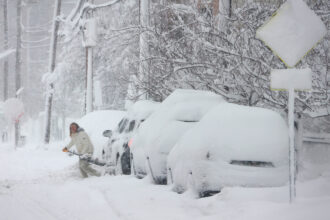Two weeks of tense global climate talks wrapped up on Friday, with countries insisting they had made progress on technical issues but accepting they were still nowhere near agreement in the three key areas of finance, greenhouse gas emission cuts and the future of the Kyoto protocol.
Christiana Figueres, executive secretary of the UN climate secretariat, defended the UN against charges by non-governmental groups that the talks were painfully slow and convoluted, saying the economic crisis in Europe and elsewhere was making it harder to make progress.
“Climate [change talks] are the most important negotiations the world has ever seen, but governments, business and civil society cannot solve it [climate] in one meeting. Countries are being very creative, exploring all options,” she said at the close of the conference in Bonn.
Figueres warned that there could a gap between commitment periods for the Kyoto Protocol, the only global treaty legally binding rich countries to cut emissions — the first phase of which ends in 2012. “Governments can double their efforts and come forward with middle ground solutions and options which are acceptable to all sides,” she said.
The EU, which was challenged to lead negotiations by committing itself to a second round of Kyoto, said developing countries had to prove they had met all agreements made in Copenhagen and Cancún last year.
“We are ready for an international deal … but we need everyone aboard. A second commitment period on its own is not going to cut it. We need to see more progress [in other areas],” said Jozsef Feiler, an EU spokesperson.
Non-governmental groups said they were deeply frustrated at the snail pace of negotiations and whole days lost while countries debated the agenda of the talks.
Bolivia, which was isolated at the end of the Cancún talks when it insisted on deeper emission cuts, said it was worried at the lack of ambition. “There have been some small advances in technical issues, but no advance at all in the key issue of pledges for emission reductions. If there are no new pledges [soon], we face a very difficult situation,” said Pablo Solon, ambassador to the UN in New York.
“The developed countries are not moving. The problem we face is that we are on a path to [warming of] 4-5C. That is the reality. That worries us very much. The problem is the lack of ambition,” he said
Quamrul Chowdhury, a negotiator with the G77 group of developing countries, said that the talks were like the end of a long cricket test match with both sides playing for a draw. “No-one wants to lose anything at this stage.”
“Europe should use its power to secure a second commitment period of Kyoto, even if only as a stop-gap before the creation of an entirely new global deal,” said Mohamed Adow, senior adviser on global advocacy for Christian Aid.
About This Story
Perhaps you noticed: This story, like all the news we publish, is free to read. That’s because Inside Climate News is a 501c3 nonprofit organization. We do not charge a subscription fee, lock our news behind a paywall, or clutter our website with ads. We make our news on climate and the environment freely available to you and anyone who wants it.
That’s not all. We also share our news for free with scores of other media organizations around the country. Many of them can’t afford to do environmental journalism of their own. We’ve built bureaus from coast to coast to report local stories, collaborate with local newsrooms and co-publish articles so that this vital work is shared as widely as possible.
Two of us launched ICN in 2007. Six years later we earned a Pulitzer Prize for National Reporting, and now we run the oldest and largest dedicated climate newsroom in the nation. We tell the story in all its complexity. We hold polluters accountable. We expose environmental injustice. We debunk misinformation. We scrutinize solutions and inspire action.
Donations from readers like you fund every aspect of what we do. If you don’t already, will you support our ongoing work, our reporting on the biggest crisis facing our planet, and help us reach even more readers in more places?
Please take a moment to make a tax-deductible donation. Every one of them makes a difference.
Thank you,












